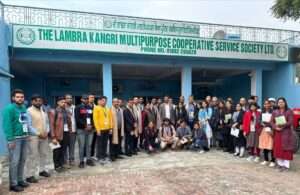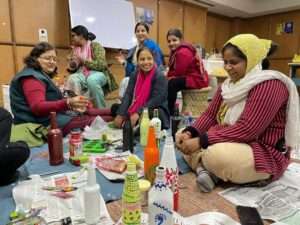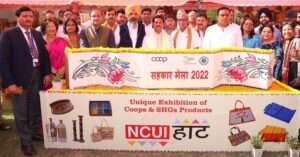As we celebrate the 102nd International Day of Cooperatives on 6th July 2024, Sagar Kisan Wadkar in this blog discusses the global as well as the Indian status of cooperatives, and highlights the importance of extension and advisory services in making cooperatives more skilled, standardized, scaled up, and sustainably competitive, thereby aiming to transform these into self-regulatory institutions.
WHY COOPERATIVES?
Cooperatives are people-centred enterprises owned and run by members to meet their common economic, social, and cultural needs. This model promotes fair resource distribution and economic benefits, especially for small producers and consumers, by achieving economies of scale, enhancing bargaining power, and reducing costs through combined resources. Cooperatives emphasize community development and ethical practices, and also support local economies and social cohesion.
They embody self-help, solidarity, and sustainability, offering education and training to promote individual and group growth. Recognized globally as a sustainable and inclusive business model, cooperatives will celebrate the International Day of Cooperatives on July 6 with the theme ‘Cooperatives Build a Better Future for All’ (Box 1).
|
Box 1: The International Day of Cooperatives (IDC) This year on July 6, cooperatives around the world will celebrate with the theme “Cooperatives Build A Better Future For All” and it will mark the 102nd International Cooperative Day. Cooperatives will have the opportunity to showcase their current and historical contributions to building a sustainable future, accelerating efforts to implement the Sustainable Development Goals (SDG) by 2030. This year’s theme aligns well with the objectives of the upcoming UN Summit on ‘multi-lateral solutions for a better tomorrow’. This day will also build momentum towards the 2025 International Year of Cooperatives, which was declared by the UN last year. |
CHALLENGES OF THE 21st CENTURY AND ROLE OF COOPERATIVES
Since 1904, the Indian Cooperative Movement has navigated a 120-year-old journey (Box 2), marked by both achievements and challenges, significantly contributing to India’s economy through pivotal revolutions such as the Green, White, and Blue Revolutions. However, the 21stcentury is characterized by complex challenges, including striking economic inequality, marked environmental degradation, increasing social fragmentation, and rapid technological advancements. Cooperatives address these issues by promoting economic inclusion through access to markets, fair wages, and profit-sharing, thus reducing the gap between the rich and the poor.
From an environmental perspective also, cooperatives are at the forefront of implementing sustainable practices, such as precision farming, organic farming techniques, and the promotion of biodiversity. Some examples are three newly established Multi-State Cooperative Societies, Bhartiya Beej Sahakari Samiti Ltd, BBSSL; National Cooperative Organics Ltd, NCOL; National Cooperative Exports Ltd, NCEL. The cooperatives are actively involved in supporting renewable energy projects, such as community-owned solar power (Dhundi Solar Energy Producers’ Cooperative Society) and hydro-power initiatives(Multi-State Energy Consumers’ Cum Producers’ Cooperative Society Ltd. Sikkim), which contribute to reducing carbon footprints (for instance IFFCO, Indian Farm Forestry Development Cooperative Ltd.) and promoting sustainable energy use. Moreover, cooperatives are instrumental in developing and marketing eco-friendly products, thereby promoting a circular economy that minimizes waste and maximizes resource efficiency (Swach Coop; AMUL; SEWA).
Cooperatives enhance social cohesion by building community bonds, promoting collaboration among diverse groups, and providing education and training to improve members’ skills and economic prospects. Additionally, they help members adapt to technological advancements by investing in education and leveraging technology to improve operations and efficiency, ensuring that technological progress benefits everyone.
|
Box 2: Indian Cooperative Movement According to the National Cooperative Database (NCD, June 2024), around 8.08 lakh cooperatives with about 29 crore members are present in more than 29 sectors. Out of this total, housing cooperatives make up 23.77%, followed closely by dairy cooperatives at 17.78%, Primary Agricultural Credit Societies (PACS) at 12.30%, credit & thrift at 9.94%, and labour cooperatives at 5.55%. According to the World Cooperative Monitor (WCM)2023, Indian cooperative organizations such as IFFCO, GCMMF and KRIBHCO are the top performers in the agriculture sector. Additionally, ULCCS is ranked second in the industry and utility sector, and eleven cooperative banks (six State Coop Banks, four Urban Coop Banks, and one credit society) are among the top 300 cooperatives globally. Despite this impressive performance, India needs a policy push to replicate this success across other sectors. |
STRENGTHENING OF THE COOPERATIVE MOVEMENT IN INDIA
The Government of India is committed to strengthening the cooperative movement through the Ministry of Cooperation’s 54 initiatives. Collaborating with state governments, central ministries, and cooperative federations, these efforts aim to enhance cooperative governance, ease of doing business, and financial access, while ensuring transparency and accountability. By improving operational efficiency and enabling real-time monitoring, these measures empower cooperatives to become more efficient, competitive, and thus significantly contribute to the socio-economic development of their members and the whole nation.
ENHANCING THE RESILIENCE AND IMPACT OF THE INDIAN COOPERATIVE SECTOR
Though recent attempts by the Ministry of Cooperation have resulted in significant improvements, the cooperative sector needs more strengthening to ensure diversity and continued growth. The following aspects need to be emphasised in this regard.
1. Youth Involvement and Leadership Development
India alone has over 400 million young people. According to the Youth in India (2022) Report and the Report of Technical Group on Population Projections for India and States (2011-2036),addressing gender disparities in labour force participation remains crucial if more inclusive economic growth is to be achieved. With rising unemployment, cooperatives can engage youth as members, board directors, or employees, allowing them to implement innovative ideas and diversify businesses. The National Cooperative Development Corporation (NCDC) supports start-ups through the YUVA SAHAKAR scheme. The Banking Regulation (Amendment) Act 2020 sets qualification criteria and term limits for directors in Cooperative Banks, promoting opportunities for qualified professionals. Targeted policies are needed to involve youth as board directors with the required qualifications, and as employees with appropriate service rules tailored to the nature of cooperative businesses.
 Lambra Kangri PACS Visit by Diploma in Coops Participants
Lambra Kangri PACS Visit by Diploma in Coops Participants
2. Technology Adoption and Usage
The Ministry is computerizing 63,000 PACS and connecting them with 351 District Central Cooperative Banks, 34 State Cooperative Banks, and NABARD using integrated software to enhance transparency and streamline operations. Expanding digital platforms across 29 cooperative sectors aims to improve management, transparency, and communication among members. Advanced technologies can optimize operations, supply chain management, market prediction, product traceability, and decision making. Given that potential job displacement is a challenge posed by Artificial Intelligence, cooperatives can mitigate this challenge by re-skilling members to leverage AI for efficiency and sustainable growth in the sector.
3. Women’s Participation and Gender Responsive Leadership
Women’s participation in cooperatives enriches idea diversity and leadership. According to the Periodic Labour Force Survey (PLFS), despite improvements in labour force and worker participation rates for both genders, a persistent gender gap highlights ongoing social, cultural, and economic challenges. So, targeted policies are needed to boost female participation and employment, especially in the formal sector. The Multi-State Cooperative Societies (amended) Act 2023 decrees two women directors on cooperative boards. Similar amendments in State Cooperative Societies Acts are essential to enable women to take on significant roles in cooperatives and drive grassroots economic empowerment.
 NCUI Incubation Centre Skill Development training
NCUI Incubation Centre Skill Development training
4. Cooperative Entrepreneurship: Promotion and Formation of Cooperatives in New and Emerging Sectors
Cooperative entrepreneurship needs progressive cooperative legislation to promote innovative coop-start-ups. Cooperatives already have a presence in sectors such as health, tourism, transport, handloom and handicrafts. Concerted efforts and enabling policies to improve their governance, management and business model are needed. Additionally, expanding the cooperative model in new and emerging sectors such as agribusiness, renewable energy, insurance, retail, services, Information Technology, education, sports/recreation, etc., can have tremendous capacity to promote social capital and contribute substantially to the national economy. The existing incubation centres may be encouraged to extend support to cooperatives and promote cooperative start-ups. A dedicated fund may be established to support cooperative education & training institutions to handhold cooperatives, inculcate cooperative ideology, and promote cooperative entrepreneurship.
5. Hub & Spoke Model: Commodity-Specific Value Chains
Commodity-specific value chains are essential, and while Farmer Producer Organizations (FPOs) address this need, they face challenges that limit their potential. Implementing Model Bye-Laws for PACS nationwide can harness biodiversity and improve commodity procurement. The PACS and FPOs can act as aggregation agents, and manufacturing hubs may be established at the district-level for value addition and processing, with marketing as the need of the hour. End-to-end value chains for seed production, organic farming, certification, marketing, and export, like PACS’s business relationships with IFFCO and KRIBHCO, should be developed with the three newly established national societies i.e. BBSSL, NCOL and NCEL. This focus ensures higher quality, traceable products, better prices, and sustainable practices from production to marketing.
 Training of Trainers for establishing Coffee Value Chain as part of the development of coffee cooperatives at Lao PDR
Training of Trainers for establishing Coffee Value Chain as part of the development of coffee cooperatives at Lao PDR
ROLE OF COOPERATIVE EXTENSION AND ADVISORY SERVICES IN PROMOTING COOPERATIVES
Cooperative Extension and Advisory Services (CEAS) play a significant role in the growth and sustainability of the cooperative movement in India. CEAS encompasses a range of activities including education, training, advisory services, mentoring and support for innovation, all of which are crucial for empowering cooperatives to meet contemporary challenges and opportunities. At a broader level, CEAS consists of four elements: Regulation& Monitoring, Promotion of Cooperatives, Cooperative Education &Training, and Advisory Services. Each element plays a critical role in the effective functioning of cooperatives, adhering to legal standards, achieving their purpose of togetherness and evolving as self-regulatory institutions.
Regulation and Monitoring
Cooperatives with membership from more than one State are governed under the MSCS Act 2023 and cooperatives with membership confined to a single State are administered under relevant State-specific laws. The Central Registrar of Cooperative Societies (CRCS) at the national level and the Registrar of Cooperative Societies (RCS) at the state level, supported by Additional RCS, Deputy Registrar, Joint and Assistant Registrar are responsible for the registration, regulation, and monitoring of MSCS and cooperative societies, respectively. Efforts are being made to computerise cooperation departments across the country, along the lines of the CRCS portal, for multi-state cooperative societies to improve the ease of doing business for cooperatives.
Promotion of Cooperatives
At the grassroots level, District Cooperative Unions (DCUs) support primary cooperatives by facilitating policies and programs. State Cooperative Unions/Federations (SCUs/SCFs) coordinate DCUs, collaborate with the RCS Office and State Government, and provide member education and training. Nationwide, the National Cooperative Union of India (NCUI), as the apex organization, represents all cooperatives, including SCUs/SCFs and sectoral federations. It works with the Ministry of Cooperation to implement policies and programs, conducts research, and promotes the cooperative movement across India, ensuring cohesive development.
Cooperative Education and Training (CET)
Cooperative training programs focus on educating members, leaders, and managers on cooperative principles, governance, financial management, and business development. These programs aim to enhance the competence of cooperative personnel, enabling them to manage operations efficiently and effectively.
Various institutions, including the Vaikunth Mehta National Institute of Cooperative Management (VAMNICOM), an apex training institution, National Centre for Cooperative Education (NCCE) at NCUI, the National Council for Cooperative Training (NCCT) with 19 institutions across the country, the Laxmanrao Inamdar National Academy for Cooperative Research and Development (LINAC) under NCDC, the Bankers’ Institute of Rural Development (BIRD) under NABARD, the National Dairy Development Board (NDDB), and the College of Agricultural Banking (CAB) under RBI, possess the necessary infrastructure to provide comprehensive training and education for cooperative personnel. Furthermore, Training Centers (such as117 Junior Cooperative Training Centers, JCTCs) affiliated to State Cooperative Unions (SCUs) and State Governments, as well as State and District Central Cooperative Banks also have dedicated training and educational facilities to deliver cooperative training and education to their respective stakeholders. However, more efforts are required to strengthen these institutions in terms of physical and digital infrastructure and by engaging (cooperative) sector-specific faculty and professionals.
Business Development Services: Collaboration and Convergence with Technical Institutions
CET institutions are primarily engaged in member education, leadership development and employee training. However, there is need to collaborate with sectoral institutions such as the Indian Council of Agricultural Research (ICAR), State Agricultural Universities (SAUs), and Krishi Vigyan Kendras (KVKs) to provide technology backstopping and business facilitation. Similarly, partnerships with technical institutions – National Institute of Fashion Technology (NIFT), Indian Institute of Technology, The International Renewable Energy Agency, and The Energy & Resource Institute – are required to promote innovative cooperative start-ups in new and emerging sectors. These collaborations can expand the impact of cooperatives across industries. The NCUI’s two first-of-its-kind platforms, CEAS-Learning Management System (LMS) Portal and NCUI Haat – e-Commerce Portal, offer online learning to members and the public and provide a marketing platform for cooperatives, bridging information and knowledge gaps.
 NCUI Coop Fair – Annual Event for Promotion of Cooperative Products and Services
NCUI Coop Fair – Annual Event for Promotion of Cooperative Products and Services
FUTURE PROFESSIONAL OPPORTUNITIES IN CEAS
As the cooperative movement evolves, several emerging trends and future prospects are poised to shape the CEAS landscape. One significant trend is the increasing demand for sector-specific professionals within the cooperative movement. These professionals can offer tailored support and guidance to cooperatives by addressing sector-specific challenges and capitalising on emerging opportunities. Additionally, the complexity of regulatory frameworks governing cooperatives underscores the need for cooperative law specialists. These experts play a crucial role in ensuring legal compliance, navigating regulatory challenges, and safeguarding the sustainability of cooperative ventures. Moreover, there is a need to strengthen Union and State departments of cooperation as well. Despite the significant role played by cooperatives in socio-economic development, vacancies in key positions within the department often remain unfilled. To address this issue, concerted efforts are needed to attract and retain skilled professionals who are passionate about cooperative principles and committed to driving the sector forward.
CONCLUSION
The International Day of Cooperatives serves as a significant reminder of the immense potential and impact of cooperative enterprises in promoting sustainable development and social inclusion. Celebrated globally, this day underscores the essential role cooperatives play in addressing contemporary challenges such as economic inequality, environmental degradation, and social fragmentation. By uniting diverse members and leveraging collective resources, cooperatives exemplify the principles of fairness, solidarity, and sustainability. The recent celebrations in India, including the themes Cooperatives Build a Better Future for All and Amrit Kaal- Prosperity through Cooperation for a Vibrant India, highlight the ongoing efforts and success of cooperatives in driving economic growth and community development.
Happy International Day of Cooperatives to all! Let us promote cooperative identity!!!
 Dr. Sagar Kisan Wadkar is currently serving as Adviser (Research & Study) to the National Cooperative Union of India (NCUI), New Delhi. His interests include cooperative law, social entrepreneurship, and livelihood analysis. He can be reached at sagarkwadkar@gmail.com
Dr. Sagar Kisan Wadkar is currently serving as Adviser (Research & Study) to the National Cooperative Union of India (NCUI), New Delhi. His interests include cooperative law, social entrepreneurship, and livelihood analysis. He can be reached at sagarkwadkar@gmail.com









Thank you Dr. Sagar for writing this very comprehensive blog highlighting the current status of cooperatives and role of EASs in strengthening cooperatives.
Thanks to AESA too for publishing this important blog.
In the 1950s, no one would have imagined that a newly independent milk deficit nation could ever become self-sufficient and emerge as the world’s largest milk producing nation, contributing towards one-fourth of global production – thanks to dairy cooperatives which connected rural milk producers to urban consumers through national milk grid value chain.
Off late restrictive laws, bureaucratic control, political entrenchment and corruption have ruined the efficiency of dairy cooperatives (see AESA blog no.102 by Dr. S.V.N. Rao on Dairy cooperatives at crossroads).
Dairy cooperatives need more freedom to operate as business entities in competitive market. Amendment of Indian Companies Act in 2003 is a welcome step in this direction which resulted in the emergence of ‘Producer Company’ concept.
The NDDB is also promoting conversion of traditional dairy cooperatives into new generation milk producers companies (MPCs) and some of India’s large MPCs like Maahi (Guajarat), Paayas (Rajasthan), Saahaj (UP), Baani (Punjab) and Sreeja (AP) have been supported by NDDB.
More than half of the active MPCs are in just four states: Maharashtra, Rajasthan, MP and UP.
Unlike dairy cooperatives, MPCs tend to have a large number of farmer shareholders as many MPCs have been converted from older dairy cooperatives with significant membership and capital. Furthermore, even new dairies find it relatively easier to ramp up their membership and operations quickly because the dairy sector has a well-established blueprint for collectivization, procurement, processing and sales.
Hope the New Ministry created in 2021 for Cooperatives give new dimensions and further promote the cooperative sector in the country.
Thank you!
There are no two opinions about the necessity to strengthen the cooperative organisations in the country and the governments both at the centre and at the state levels must extend full support for their growth and development.
A recent review on dairy coops published in EPW by Rupesh Kaushik (2024) revealed that “Indian cooperatives are primarily restricted to sugar, dairying, and handloom sectors. Cooperatives have mostly failed to perform as per expectations, barring milk and sugar cane cooperatives, specifically in Maharashtra and Gujarat.” Even in milk except for Gujarat and Karnataka in all the other states the cooperatives are facing stiff competition from private sector and the share of private sector in total milk marketing sale has gone up to 50 % leaving the rest to cooperatives and producer companies. For example Hatsun and Godrej Jersey leading private dairies have registered spectacular growth in South India and their growth is at the cost of coop dairies.
Although, the cooperatives are owned and managed by their members, majority of the members neither participate actively nor consider themselves as owners of the coops. It is well established that the milk cooperatives will be successful when there is active participation from the members, least interference from the Government, good governance and adherence to the cooperative principles laid down by the ICA. Similarly, the FPOs are not able to succeed mainly because of poor management and corruption.
Unless these vital issues are addressed the chances of the Government initiatives succeeding in strengthening the coops are bleak.
Thanks to Dr. Sagar Kisan Wadkar for giving us this useful blog on the occasion of celebrating 102nd International day of cooperatives and also to AESA for publishing it.